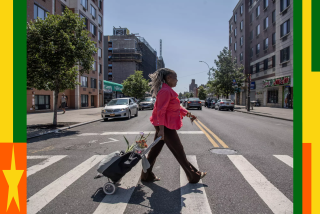In Venezuela, Chavez’s Rivals Plan a Team Effort
Candidates opposing Hugo Chavez in Venezuela’s December presidential election have decided to participate in a winner-take-all primary Aug. 13 to choose a single candidate whom they all promise to support.
It is a measure of their weakness that politicians from the nine disparate parties decided on the joint primary in a bid to galvanize an opposition that has largely given up hope of defeating Chavez.
Major opposition parties boycotted last December’s congressional elections after alleging that Chavez had rigged the system. Chavez supporters countered that the opposition was merely acknowledging the likelihood it would lose.
Polls indicate that Manuel Rosales, governor of oil-rich Zulia state, and Julio Borges, a former assemblyman and TV show host, are the leading opponents, but they trail Chavez by a wide margin. Behind both is Teodoro Petkoff, a 74-year-old leftist editor and former planning minister who announced he would not participate in the primary but would still run against Chavez.
Chavez has parlayed his country’s enormous oil wealth into a welfare program he calls “socialism for the 21st century.” About 3.5 million people are thought to receive money monthly from the government through health and education initiatives, retail and industrial cooperatives and other programs.
Critics say Chavez is an autocrat who dispenses largesse at his discretion. His defenders say that thanks to Chavez, the government has put the nation’s poverty at center stage and dedicated resources to deal with it. In any case, the programs have earned him a following among the poor, who are his bedrock supporters.
Although a strong favorite to win a third term, Chavez is not invincible, pollsters say. Recent surveys have turned up growing dissatisfaction with his foreign aid programs designed to win allies abroad. The president is thought to have promised at least $20 billion in such programs, including cut-rate oil to Caribbean nations and generous loans to Argentina.
His frequent travels abroad and close identification with Cuban leader Fidel Castro also have rubbed many Venezuelans the wrong way, as has his tacit encouragement of squatters to take over buildings and farms, pollsters say.
Venezuelans identify more with the United States and its way of life than with Cuba, despite Chavez’s strident criticism of President Bush and the so-called U.S. imperium, surveys show.
“A majority of people, about 56%, approve of Chavez generally, but it’s a conditional support,” said Alfredo Keller, a Caracas-based political consultant. “People like it when he explains a problem but not what he does about the problem.”
Sensing a weakness, Rosales, 52, and Borges, 36, slammed Chavez’s foreign giveaways as they campaigned last week.
“ ‘Socialism for the 21st century’ is a melange of ideas -- a little of this, a little of that -- that no one understands, not even Chavez,” Rosales said in an interview between campaign stops Friday in Valencia, the country’s third-largest city. “Venezuela is in a profound social and economic crisis and is waiting for new leadership.”
At a news conference Sunday, Borges criticized Chavez for his frequent foreign trips, saying the president had spent five months of his seven years in office out of the country. Giveaways amounting to $21 billion to 26 countries have deprived Venezuelans of funds for better medical care, education and infrastructure, Borges said.
But Borges said he and other candidates faced a challenge merely persuading some anti-Chavez voters to take part in the primary. A portion of the opposition thinks that Chavez has such control over the electoral apparatus that any effort to oppose him is futile, Borges said, and that the only meaningful action is to boycott.
Borges said December’s boycott of congressional elections was a mistake.
“The primary will allow us to legitimize the opposition. It’s not a question of selecting a leader but of legitimizing a path,” Borges said.
The primary is being organized by Sumate, an electoral rights organization that has helped rally opposition to Chavez. About $500,000 in donated funds will be used to finance the vote and 50,000 volunteers will help run it, said Sumate leader Maria Corina Machado.
She and another Sumate leader, Alexander Plaz, face possible criminal charges for having accepted $31,000 from a U.S. political action group, allegedly in violation of Venezuelan campaign laws that prohibit parties from accepting foreign donations.
Pro-Chavez members of Congress have called for the arrest of Machado and Plaz. Machado and Plaz respond that their group is not a political party but a nonaffiliated organization formed to promote democracy.
More to Read
Start your day right
Sign up for Essential California for news, features and recommendations from the L.A. Times and beyond in your inbox six days a week.
You may occasionally receive promotional content from the Los Angeles Times.






